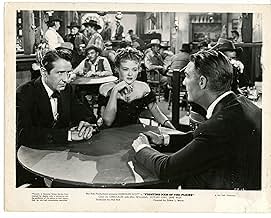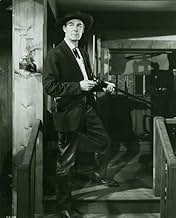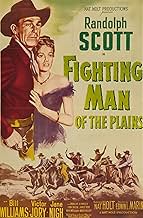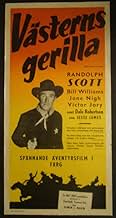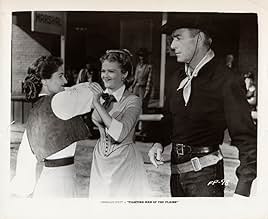NOTE IMDb
6,4/10
611
MA NOTE
Ajouter une intrigue dans votre langueFormer bandit Jim Dancer becomes marshal of a Kansas town and cleans up the criminal element--with help from an old pal, Jesse James.Former bandit Jim Dancer becomes marshal of a Kansas town and cleans up the criminal element--with help from an old pal, Jesse James.Former bandit Jim Dancer becomes marshal of a Kansas town and cleans up the criminal element--with help from an old pal, Jesse James.
- Réalisation
- Scénario
- Casting principal
Avis à la une
Although I only saw this film once (when it was released 50 years ago), it is one of my favorite Randolph Scott westerns. The combination of a turbulent setting (Quantrill's murderous raid on Lawrenceville, Kansas, and post Civil War Kansas ) and the main character's efforts to atone for his wartime actions by keeping the peace in a violence prone Kansas cow town rank it even with or better than Scott's later films directed by the acclaimed director, Budd Boetticher.
Renowned western novelist Frank Gruber wrote the script of FIGHTING MAN OF THE PLAINS (1949) based on his own book. It tells the story of Jim Dancer (Randolph Scott), a fugitive outlaw who'd been part of Captain William Quantrill's infamous raid on Lawrence, Kansas on August 21, 1863. Dancer is apprehended by a "Pleasanton" (read: Pinkerton) detective who is then killed in an accident, allowing Dancer to take his identity and wind up in Lanyard, Kansas, where he's pressured into taking the job of Marshal after fearlessly subduing some rowdy cowboys. It's a fairly corrupt town, but the new Marshal does a good job of keeping the peace and gets aid from some unexpected quarters at the local gambling hall.
The script is awash in simmering undercurrents, including the fact that the man who owns the town, Slocum (Barry Kelley), had killed Dancer's brother during the war, and Dancer had killed Slocum's brother in response during the Lawrence raid. Slocum's niece (Joan Taylor), who'd witnessed the killing of her father a decade earlier, lives with her uncle but fails to recognize Dancer as the culprit and begins to fall for him. Meanwhile the gambling saloon owner, Oldham (Victor Jory), finds his voluptuous partner, Florence (Jane Nigh), falling for Dancer as well. Eventually, Slocum alienates both the local cattlemen and the railroad company through his efforts to control all the land around town and a showdown is inevitable. At one point, a detective from Chicago shows up, summoned by the suspicious Slocum, to see if "Marshal Cummings" (Dancer's new identity), is indeed his old detective buddy. To make matters worse, Slocum's got cocky young gunslinger Johnny Tancred (Bill Williams) in his pocket, ready to take over when the tide turns. Dancer has his own ace in the hole, however, thanks to his old wartime associations. The finale offers a clear violation of the Production Code, but I can see where the blurred lines between good and bad, lawman and lawbreaker, "respectable" and disreputable could have easily confused the censors.
Lots of stuff happens in the movie and the cast of characters is quite colorful. Things never slow down and surprises come at us pretty quickly. I had a great time watching this. I never felt it getting too far-fetched for me. The cast includes plenty of old hands at this kind of thing (Scott, Jory, Paul Fix, Douglas Kennedy) and a few new hands (Taylor, Nigh, Williams) and they're all good. Jory is particularly awesome. He comes off initially as his patented oily gambler, but he proudly defies our expectations. Future western star Dale Robertson appears as Jesse James in his first credited role. He has only two scenes—one good one and one great one. Film noir regulars Barry Kelley and Berry Kroeger are both on hand, one as a bad guy and one who'll surprise you.
I watched this on TCM, which showed a black-and-white print of a Cinecolor film. I hope someone finds a color print and releases it on DVD.
The script is awash in simmering undercurrents, including the fact that the man who owns the town, Slocum (Barry Kelley), had killed Dancer's brother during the war, and Dancer had killed Slocum's brother in response during the Lawrence raid. Slocum's niece (Joan Taylor), who'd witnessed the killing of her father a decade earlier, lives with her uncle but fails to recognize Dancer as the culprit and begins to fall for him. Meanwhile the gambling saloon owner, Oldham (Victor Jory), finds his voluptuous partner, Florence (Jane Nigh), falling for Dancer as well. Eventually, Slocum alienates both the local cattlemen and the railroad company through his efforts to control all the land around town and a showdown is inevitable. At one point, a detective from Chicago shows up, summoned by the suspicious Slocum, to see if "Marshal Cummings" (Dancer's new identity), is indeed his old detective buddy. To make matters worse, Slocum's got cocky young gunslinger Johnny Tancred (Bill Williams) in his pocket, ready to take over when the tide turns. Dancer has his own ace in the hole, however, thanks to his old wartime associations. The finale offers a clear violation of the Production Code, but I can see where the blurred lines between good and bad, lawman and lawbreaker, "respectable" and disreputable could have easily confused the censors.
Lots of stuff happens in the movie and the cast of characters is quite colorful. Things never slow down and surprises come at us pretty quickly. I had a great time watching this. I never felt it getting too far-fetched for me. The cast includes plenty of old hands at this kind of thing (Scott, Jory, Paul Fix, Douglas Kennedy) and a few new hands (Taylor, Nigh, Williams) and they're all good. Jory is particularly awesome. He comes off initially as his patented oily gambler, but he proudly defies our expectations. Future western star Dale Robertson appears as Jesse James in his first credited role. He has only two scenes—one good one and one great one. Film noir regulars Barry Kelley and Berry Kroeger are both on hand, one as a bad guy and one who'll surprise you.
I watched this on TCM, which showed a black-and-white print of a Cinecolor film. I hope someone finds a color print and releases it on DVD.
This is a real humdinger of a western. The plot and dialogue move along quickly, with no time wasted on unlikely romance or saloon song. On the contrary, this tight little gem centers fully and solely on the great Randolph Scott. Here, Scott is at his lean, trim, handsomest best; the director senses this, and the film is noteworthy for featuring a number of lovely, soft, lingering close-ups of Randolph's grim face. To me, this is a wonderful touch and a delightful tribute to one the Westerns' greatest stars.
The co-stars are fine as well, but they definitely play second fiddle to Scott. One unexpected twist involves the town's "tinhorn" gambler, played by Victor Jory. Jory is the only member of the town to recognize Scott as a wanted outlaw, and is certainly in a position to blackmail him; however, in a quite unusual development, Jory chooses to befriend Scott, and remains his loyal friend to the end.
"Fighting Man on the Plains" is the perfect late-40's Western, a fully mature old-fashioned good-guys vs. bad-guys bit of adult theatre, a genre film crafted to its full potential; and it sets the stage nicely for the more psychologically complex Westerns of the 50's.
Highly recommended for lovers of Westerns.
The co-stars are fine as well, but they definitely play second fiddle to Scott. One unexpected twist involves the town's "tinhorn" gambler, played by Victor Jory. Jory is the only member of the town to recognize Scott as a wanted outlaw, and is certainly in a position to blackmail him; however, in a quite unusual development, Jory chooses to befriend Scott, and remains his loyal friend to the end.
"Fighting Man on the Plains" is the perfect late-40's Western, a fully mature old-fashioned good-guys vs. bad-guys bit of adult theatre, a genre film crafted to its full potential; and it sets the stage nicely for the more psychologically complex Westerns of the 50's.
Highly recommended for lovers of Westerns.
Randolph Scott plays a bit of a poacher-cum-gamekeeper in this western adventure. Here, he ("Dancer") starts off riding with the infamous Capt. Quantrill during the American Civil War. He is misled by his cohort "Yancey" (Paul Fix) into believing that an old man they encounter in Kansas killed his father, so he does for him too. It soon turns out, though, that it was the deceased man's brother that did the deed, and by now "Dancer" is being sought by the authorities. When he is apprehended, serendipity take a fateful hand as his captor is accentually killed and he assumes his identity, Next thing, he's a town marshal and a battle royal is shaping up between his new found friends and his old protagonist "Slocum" (Barry Kelley). The sequential nature of the story telling keeps the action coming thick and fast, and Scott does an adequate job. The rest of the cast are neither here nor there, though - especially the really rather lacklustre Jane Nigh ("Florence") and an oddly un-menacing "Tancred" (Bill Williams). Still, its almost bang on 90 minutes, and makes for a perfectly watchable western feature with plenty going on.
An unusual, slightly quirky Randolph Scott western with Scott playing a reformed outlaw keeping the peace with more amiable roles than usual for Victor Jory and Berry Kroger, and Jane Nigh as a rather equivocal female lead. There are also brief appearances by Dale Robertson with an introducing credit as Jesse James and James Griffith making an even briefer appearance in the opening scene as the despicable William Clarke Quantrill.
Le saviez-vous
- AnecdotesJames Millican portrays a private detective who arrests Randolph Scott, who is playing a former member of Quantrell's Raiders. In Les Massacreurs du Kansas (1953), Millican plays Quantrell and once again, Scott is one of his former Raiders.
- Crédits fousOpening credits prologue:
The vast plains of the American West proved a barrier so formidable that the westward march of civilization faltered before it for more than a decade. Yet Civilization must move on and the Great Plains were finally conquered. This is the story of one of these builders of the West ... Jim Dancer, bad man, outlaw ..... Fighting man of the plains.
During the desperate days of the Civil War-August 21, 1863,- Quantrell's raid on Lawrence, Kansas.
The bloody war between the states finally came to an end, but on the border the hatreds had been too great. Men continued to ride and fight and die. The name of Quantrell was heard no more, but new names were whispered, names of men who had ridden with Quantrell and were now outlaws.
1868 ARCH CLEMENTS 1869 THE YOUNGER BROTHERS 1870 JESSE JAMES 1871 JIM DANCER 1872 -
- ConnexionsReferenced in Unguarded Moment (1951)
Meilleurs choix
Connectez-vous pour évaluer et suivre la liste de favoris afin de recevoir des recommandations personnalisées
Détails
- Durée
- 1h 34min(94 min)
- Rapport de forme
- 1.37 : 1
Contribuer à cette page
Suggérer une modification ou ajouter du contenu manquant

